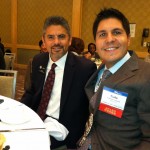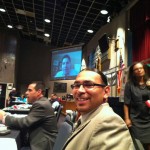In a recent University of Miami Race and Social Justice Law Review article, I discussed Senate Bill 1925, a version of Violence Against Women Act that attempts to reauthorize tribal governments’ exercise of criminal jurisdiction over certain non-Indians who violate Indian women. Regarding the State of Washington’s various political players’ stances on the issue of tribal governments’ abilities to protect Native women, I wrote:
Washington’s Senator Patty Murray (D-WA) has . . . vowed to reject any agreement with the House that does not include the tribal [jurisdiction] provisions, as has Fellow Washingtonian Senator Maria Cantwell (D-WA). . . . At the same time, Washington State Republican gubernatorial hopeful Rob McKenna advocates for mere “tribal civil authority” over non-Indian[s], stopping short of recommending the jurisdictional power that is needed to bring criminal justice – and safety – to Indian Country. While Attorney General McKenna is at least addressing the issue with some thought, which is much more than can be said of his fellow GOPers, fines and civil restraining orders are not adequate responses to reservation murder, rape, and sexual assault. McKenna’s gubernatorial opponent, Congressman Jay Inslee (D-WA), on the other hand, actually introduced the Stand Against Violence and Empower Native Women Act, H.R. 4154, 112th Cong. (2012), this March. The bill tracks S. 1925 almost word for word.
Not long after publication of this article, I was contacted by Attorney General McKenna’s office with the following email:
Attorney General McKenna[’s position] on the issue . . . is a great deal more detailed than your piece gives him credit for. I do appreciate the fact that you give him some credit for working to prevent violence against native women. Preventing DV and sexual assault against all women has been a priority for Rob McKenna predating his time as AG and has been a personal passion of his as a long-time supporter of the Eastside Domestic Violence Coalition.
To which I replied:
I agree that tribal civil jurisdiction over non-Indians should be explicitly recognized by Congress in all situations of DV in Indian Country. Although tribes already have this power, [but see Martinez v. Martinez, No. 08-5503, 2008 WL 5262793 (W.D. Wash. Dec. 16, 2008)], the explicit recognition of this in the VAWA will likely support the imposition of jail time for civil contempt findings and getting civil orders recognized by other jurisdictions. This is a very important recognition of tribal sovereignty, and I applaud Mr. McKenna for his stance on this issue.
It is apparent, however, that Mr. McKenna supports only tribal civil jurisdiction over non-Indians, and not criminal jurisdiction. . . . McKenna does not take a position on criminal jurisdiction because of “vexing jurisdictional issues.” I would submit that those jurisdictional issues are actually quite clear.
But maybe I am misunderstanding something. Does Mr. McKenna support the criminal jurisdiction provisions of S. 1925? More generally, does Mr. McKenna support tribal criminal jurisdiction over those who commit violence against Native women in Indian Country?
The Attorney General’s Office responded:
I will work with AG McKenna and our tribal issues lead, Deputy Attorney General Rob Costello, to address your questions and respond. I don’t want to misspeak or mischaracterize AG McKenna’s position on such an important issue. I did want to make sure you were aware of the letters he wrote which I read to say, “the debate over extending tribal criminal jurisdiction over non-Indians is one that will continue due to the complex civil rights issues involved and it may significantly delay other protections we CAN provide right now.” I read his letter to say while Congress continues to debate over that issue—they should enact the civil protection order solution to provide some protection NOW—and greater ability to bring criminal action against non-Indians in US courts—while the debate continues.
Two weeks later I received the following email:
Upon review of the letters, I think they speak for themselves. Thank you again for recognizing Rob’s attempt to advance the issue to protect women from violence no matter where they live.
There you have it women in Washington's Indian Country, a solid non-responsive answer.
Here’s how the Tacoma News Tribune framed the VAWA issue in terms of the Inslee-McKenna Gubernatorial race: “Inslee pushed in Congress to let tribes prosecute non-Indians accused of domestic violence on reservations; McKenna prefers to leave such cases in the hands of federal prosecutors.” And as Indian Country is well aware, if left in the hands of federal government, these crimes go unprosecuted and the assailants go free. Indeed, a recent Report by the U.N. Special Rapporteur on the Rights of Indigenous Peoples says that legislation affirming criminal jurisdiction over certain non-Indian violators of Indian women should be an “immediate priority” in U.S.
In short, Attorney General McKenna does not support limited tribal criminal jurisdiction over non-Indian domestic abusers. It is not an "priority" for him; at least not an "immediate" one. “Right now,” he instead supports the status quo, which has failed tribal communities and Indian women. While he deserves credit for going further on this issue than most Republicans will – meaning at least admitting there is a violence against Indian women problem in Indian Country – McKenna is playing it far too safe for fear of offending his GOP base as he vies for the Washington Governor’s Mansion. Congress, namely the House GOP, has no intention of genuinely debating the Senate’s VAWA reauthorization bill to passage, and he knows it.
Indeed, as local pundits have suggested, Attorney General McKenna has played it altogether too safe on tribal issues with a view towards this gubernatorial election: “there’s a perception here that Mr. McKenna’s performance of his duties as attorney general has been influenced by the fact that he would like to have a less than adversarial relationship with the tribes come this election cycle.”
A recent study by Chuck Tanner and Leah Henry-Tanner likewise concludes that:
Rob McKenna is not . . . an ideologically driven political activist wholly dedicated to terminating Indian Nations and abrogating their treaties. However, when legal gray areas exist (as they frequently do in federal Indian law), and Rob McKenna perceives a state interest at issue, . . . he will oppose the fundamental rights of Indian Nations and ally with anti-Indian activists to achieve his goals.
The question is now before Washington tribal voters: has Rob McKenna done enough for Indian Country? Will he be a partner to tribal governments or is his Indian policy one of political expedience? He had the opportunity to come out swinging against domestic violence in Indian Country – to hit an underhand softball – but he struck out looking.
Meanwhile, or “while Congress continues to debate over that issue,” Native women in Washington State remain virtually unprotected from domestic violence by non-Indians.
Ryan Dreveskracht is an Associate at Galanda Broadman PLLC, of Seattle, an American Indian majority-owned law firm. His practice focuses on representing businesses and tribal governments in public affairs, energy, gaming, taxation, and general economic development. He can be reached at 206.909.3842 or ryan@galandabroadman.com.




 Add finally into this debate the utter lack of elected representation for minorities in most areas of the state. The combined Latino population for 10 counties in Central and Eastern Washington, for example, is a bit higher than 33 percent. Yet, Latinos hold only 4% of those regions’ elective offices and not a single Latino lawyer has ever been elected to the bench in Eastern Washington. The same goes for Native Americans, who have yet to see an Indian judge elected to the state bench anywhere in Washington.
Add finally into this debate the utter lack of elected representation for minorities in most areas of the state. The combined Latino population for 10 counties in Central and Eastern Washington, for example, is a bit higher than 33 percent. Yet, Latinos hold only 4% of those regions’ elective offices and not a single Latino lawyer has ever been elected to the bench in Eastern Washington. The same goes for Native Americans, who have yet to see an Indian judge elected to the state bench anywhere in Washington.








